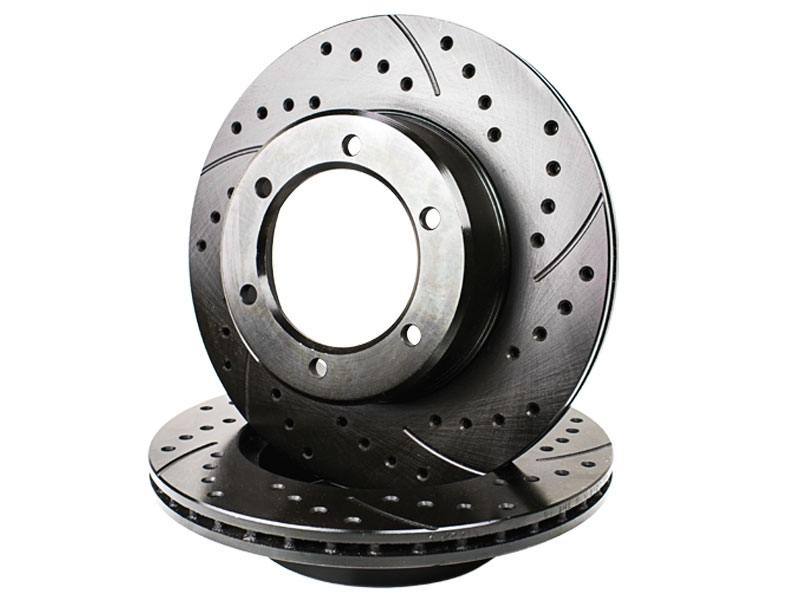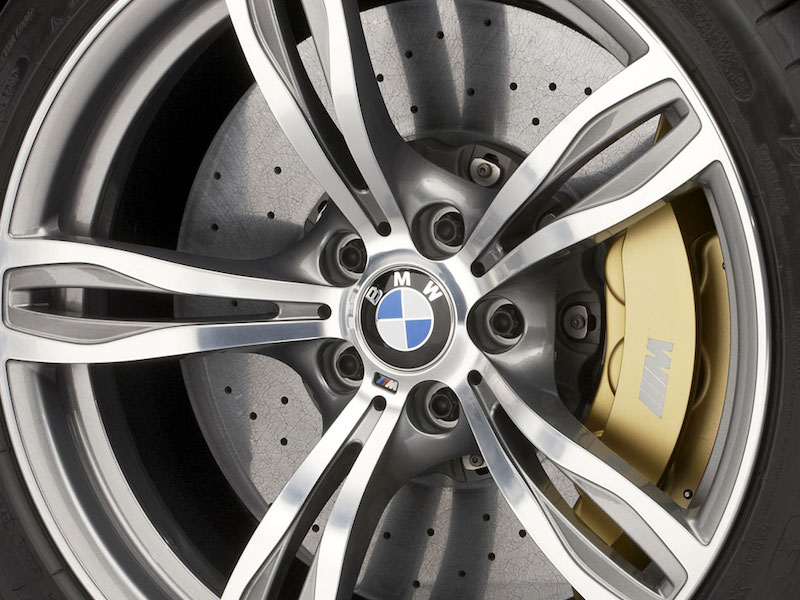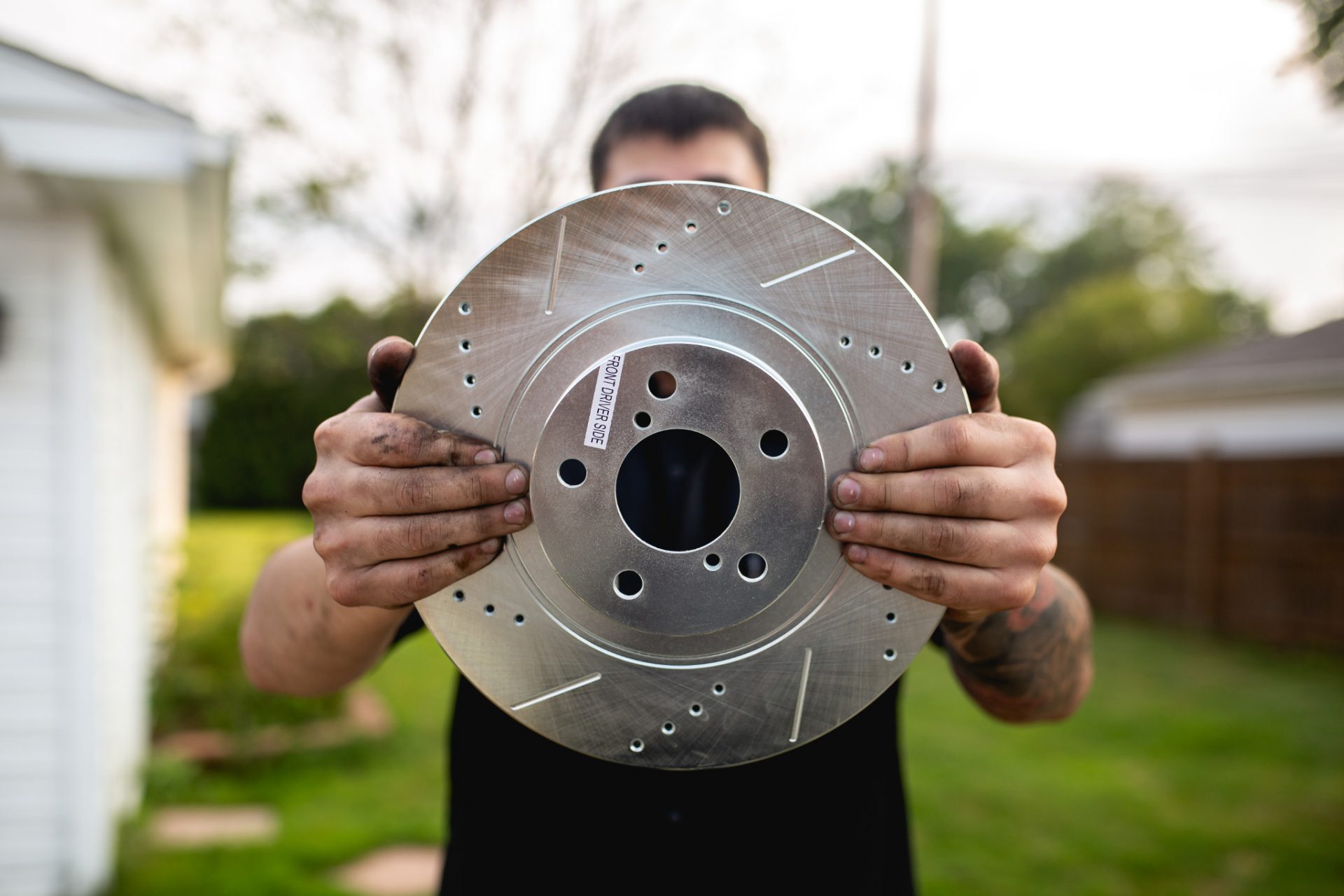Rotors are the moving part of an electromagnetic system of electric motors, generators, and alternators, playing a vital role in their operations. Drilled and slotted rotors are used mainly as brake rotors. They have holes and slots for fitting, cleaning, and operational purposes. Can you turn drilled and slotted rotors?
Table of Contents
It is essential to occasionally resurface and turn your drilled and slotted motor rotors to increase your vehicle's braking system's performance and braking power longevity. Drilled and slotted rotors in bad condition can severely damage your brake pads.
Here's a quick guide to drilled and slotted rotors and the role they play in maintaining your vehicle in pristine condition.
What Are Drilled And Slotted Rotors?
These are a type of brake rotor that is drilled with holes and has machine-made curve grooves. A brake rotor or a disc brake is a vital part of the brake system as it connects the brake pedal with the brake pad when you press down on the pedal.
Drilled and slotted rotors are specially designed to eliminate dust and moisture accumulated whenever you press the brake pedal. This also cools the brake disc, increasing friction to elevate brake performance. If the slotted and drilled rotors do not function properly, you'll find it difficult or even impossible to slow or stop your car.
These rotors are fitted in heavy-duty vehicles such as tow trucks and motorsport cars. That is because drilled and slotted brake rotors elevate the brake system's performance and multiply the stopping power to help combat brake fade, which is the slight decrease of stopping power due to intense use.
How Do Drilled And Slotted Rotors Work?
The moment you step on the brake pedal, drilled and brake rotors start to work. Every wheel has one rotor, so pressing on the brake pedal compresses all rotors simultaneously, slowing down all tires at the same time.
The pressure of brake pedals creates friction on rotors, which slowly turns down the speed, halting the vehicle. When the pressure is released, the wheels move again without any obstruction.
Rotors are manufactured from steel to make them heat resistant. Slotted or drilled rotors have gaps or ribs to dissipate the heat equally and efficiently every time the brakes are pressed.

Can You Turn Drilled And Slotted Rotors?
The easy answer is yes; you can turn cut, machine, or resurface drilled and slotted rotors. If you keep hearing the myth that it is impossible to do, take that with a grain of salt. People usually say that because it takes great precision and an expert to machine a drilled or slotted rotor correctly. But it is doable, perfectly and safely, and helps restore the rotor's quality.
However, turning doesn't mean that you can renew any rusty old rotor. The right candidate must not be warped, rustic, or damaged out of shape for the turning or resurface process to work. If your rotors do not look bad, you can restore them by approaching a professional rotor mechanic.
You must make sure to replace or turn your rotors every time you install new pads. The rotors have to be bed-in properly with the new brake pads. The turning drilled and slotted rotors process is very straightforward and divided into these simple steps:
1. Set the brake lathe on the slowest setting to avoid chatter
2. Fit the rotor on the brake lathe
3. Start the lathe on the lowest setting to not damage the rotors
The break lathe precisely cuts the rotors to bed-in properly with the pads. Next, all you need to do is fix everything into its respective space, and your rotors are good to go.
What Are The Benefits Of Turning Drilled And Slotted Rotors?
As there are mixed reviews about turning or resurfacing drilled and slotted rotors, people often think if it is beneficial or not. The truth is that there are multiple benefits of turning or resurfacing the rots. These include:
1. Improved Performance
If your rotors are not working correctly and you have never machined them before, turning them will increase their performance instantly. Old rotors stop working because they can't create the same heat and friction when compressed by brake pedals.
This means that you cannot apply the brakes smoothly. Moreover, if you keep using compromised rotors for long, they will give up and stop working altogether, leading to an accident.
So, if you turn or resurface drilled and slotted rotors, they gain back their ability to create maximum friction. As a result, your brakes operate with the same efficiency without buying new rotors.
2. Increased Operational Life
When your brakes stop working correctly and you self-examine the wheels and braking system, you must check if your rotors are still functional. However, instead of forming an opinion, ask an expert to verify if turning the rotors will extend their life or not.
If your rotors are relatively new, you don't have to replace them. Turning or resurfacing is enough to increase their operational life.
After the turning process is complete, you don't have to replace the rotors as they function as new for quite a while. You can ask your mechanic how many times you can resurface the rotors safely to keep increasing their operational life.
3. Significant Saving
One of the main benefits of reusing your drilled and slotted rotors is that you don't have to spend money on new rotors every time they stop functioning correctly. If you replace the rotors every time the friction level lowers, you will spend too much money.
Additionally, replacing your rotors once or twice a year is not a good plan for your bank account. That is because slotted and drilled rotors are expensive as they are usually used in heavy-duty vehicles.
Therefore, it is economical to turn or resurface rotors instead of replacing them. Moreover, it saves you money as you don't have to buy new rotors.

Where To Get Drilled And Slotted Rotors Turned?
Turning cross-drilled and slotted brake rotors is a complex process requiring professional efficiency. Some people commonly believe that they can turn the rotors in their garage, but it is hazardous. That is because, when DIYing the turning process, you can reduce the rotor's density to a minimum thickness level, increasing their susceptibility to warping.
As you have never turned the rotors before, you don't know how to distribute the rotors' weight during the resurface process evenly. Due to these issues, the cross-drilled rotors don't create the necessary amount of friction. Also, when the weight is not distributed evenly, it leads to shaking and vibrating of the entire wheel, taking time to stop the vehicle after you apply brakes.
Moreover, if you turn the slotted rotors in your garage, you must buy the right equipment first, which might be a lot more expensive than getting it done by a professional. The essential kit to resurface rotors is:
• Regular lathe
• New pad beds
• Sanding block or an automatic surface leveling wheel
• Dyna braid
• Dyna file
• Metalware protection headgear and respirator
• Safety goggles
If you want to turn your cross-drilled and slotted brake rotors, you need to approach a professional car workshop. Tell them your rotor's specification and the result. They expertly resurface rotors and fit them back on your vehicle without the risk of damaging the rotors.
Wrapping Up
Turning or resurfacing drilled and slotted brake rotors improves performance, enhances operational life span, and helps save you big bucks on replacing the rotors. Turning the rotors ensures suitable friction while keeping the moisture and dirt particles from invading the braking system. It is safe to turn your rotors without risking the rotors' performance and damaging their structure or stability.
However, you need a professional mechanic to ensure the rotors aren't damaged and bed-in correctly with the brake system. If you try to turn or resurface rotors at home, it costs more, and you also risk warping the rotors permanently. Find a drilled and slotted rotor turning expert near you to get the job done perfectly.

